In her book A Praying Congregation: The Art of Teaching Spiritual Practice, the author Jane E. Vennard relates that as part of a practice to help resolve conflicts over worship, she once asked a group of churchgoers who taught them to pray.
It’s a startling question. I can tell you (kind of) who taught me to navigate the Jewish prayer book, when I learned the liturgy of various prayers, and where I honed my chops as a prayer leader. But the question of who taught me to pray — not in the sense of reciting the words in a book and standing and bowing at the appropriate times, but in the deeper sense of what prayer is and why we do it — that’s a much harder question to answer.
Part of the reason may be that prayer is a naturally occurring part of human existence. It does not require a belief system or even clarity about what or who God (or god) might be. And in fact, it’s something that most of us do rather instinctively — we just don’t call it prayer.
One way we do this is through the prayer of “wow” — the instinctive rising in the heart that accompanies an awareness of the grandeur of creation. This is the prayer many feel when in nature, or in the presence of something of great beauty, or when we realize how much we are not in control of the world around us. And it is the prayer that Jewish tradition calls on us to recite when we encounter something awesome or unusual.
With your help, My Jewish Learning can provide endless opportunities for learning, connection and discovery.
The 18th-century Hasidic Rabbi Ze’ev Wolf of Zhitomir taught that prayers can become stale when they are repeated daily, so God sends us something new each day to arouse our sense of wonder.
If we are sagacious and mindful, and we realize that no moment is like another, and that what we felt in the morning is nothing like what we feel in the evening, that all is dependent on our context and conditions — then everywhere we turn our gaze, we will see the good: Divinity inhabiting whatever we view. The more we witness and know the grandeur of creation, manifest in each new moment, the more we will be aroused with love and desire to express ourselves, with awe and connection.
So, for this moment, allow yourself to recall a moment of grandeur. What did it feel like? Where did you feel that feeling in the body? As the experience returns to your consciousness, see if you can feel those feelings once again. What words come to mind?
Another dimension of natural prayer is “thank you.” This is the prayer that is at the foundation of the classical Jewish prayer practice of beginning each day with Modeh Ani, saying: “Thankful am I.” And it is the prayer that animates countless other Jewish expressions of thanksgiving, from surviving a difficult journey to using the bathroom.
But gratitude is also an automatic response. Gratitude comes to our consciousness when we heal from illness, are cared for by others who are not in our debt, receive some boon without merit, or recognize our lives hang by a thread. When a speeding car cuts us off and we don’t get into an accident, we say “thank you.” When we know that the people we love and care about are safe and whole, we say “thank you.”
Can you allow yourself to consider the feelings and words that come to your heart and mind when “’thank you” is called for as prayer?
A third dimension is the prayer of “please.” This dimension is best captured in the Amidah prayer, with its series of requests for healing, deliverance, forgiveness, and more. But this too is a naturally arising reaction to situations in which there is no one person or institution that can help us, and yet we still reach out. Sleepless at 3:00 AM, at a hospital bedside, when waiting for a lab test, when everything seems out of control, we simply say: “please.”
Too often, we think that only putting more effort in it can save us from having to ask for help. The psalmist recognized this sort of thinking and offered this advice:
Kings are not delivered by a large force;
warriors are not saved by great strength;
horses are a false hope for deliverance;
for all their great power they provide no escape.
Truly the eye of YHVH is on those who see their situation clearly,
who seek out loving care
to save them from death, to sustain them in famine.
Can you allow yourself to consider the feelings and words that come to your heart and mind when “please” is called for as prayer?
So in all these ways, you may pray already. The question is, can we learn to pray more intentionally? Can prayer become a practice that shapes and fills our lives?
Here are two ways to help make that a reality.
First, make a habit each day of intentionally finding moments of “wow,” “thank you,” and “please.” Turn to the world as it is, with all its challenges and difficulties, and find examples of grandeur, gratitude, and request. To help cultivate this as a practice, keep a journal to write down these prayer moments. Couch each of them as prayer with the prompts suggested above. And be specific: Tell what happened and how you felt. Then, after recording that event, express the prayer again. Maybe now you have more words to say. Offer them. You might even write them down too.
Second, sit quietly for a period of time. Connect your attention to one phenomenon: the sensation of breath in the body, the sounds of the world, the images coming through the window. Hold your attention there, so that the grip of the stream of thought loosens. Thoughts may still be passing through your mind, but you don’t have to think them. When you sense that you are quiet and still, open to whatever might present itself: a sensation, a feeling, a thought. Ask yourself: Is this my deepest desire? Is this what I truly want for myself and my loved ones? If not, let it go. When what arises in the mind and heart does seem so, allow it to remain with you. Feel it deeply. Root it in your heart. Then allow yourself to speak those words. Pray your deepest desire.
Who taught you to pray? Perhaps, no one. But perhaps you’ve been praying all along.



